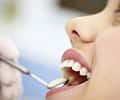So, if you or someone you love (age four or older) experiences excessive drooling, it can be the result of:
- Swallowing issues or poor mouth/tongue control that's not related to extra saliva production. It might signal a serious health issue.
- Hypersalivation is brought on by overproduction of the salivary glands. This is usually an effect of a treatable health issue.
So, how can you tell if someone's drooling is normal or excessive? And what exactly causes excessive drooling? Most importantly, how can you treat it to avoid awkward social situations.? We'll give you the scoop.
Signs and Symptoms of Excessive Drooling
Known in medical circles as sialorrhea, drooling is something we all do on occasion. Drooling might occur if you take certain medications, suffer from allergies, or undergo dental anesthesia for tooth extraction.
But if hypersialorrhea – or excessive drooling – is a constant in your life, you might experience these symptoms:
- Saliva pours down over the bottom lip frequently, resulting in facial irritation and breakdown of the skin around the mouth that looks like a rash.
- Saliva builds up in the mouth and the throat, resulting in food, drinks, and even the saliva itself going into your lungs. Once in your lungs, pneumonia or other lung issues can develop.
- Reflex issues develop, such as trouble swallowing, coughing, and gagging. For example, you might not be able to gag up food headed to your lungs.
Because excessive drooling symptoms can signal or result in a more serious health issue, we recommend getting a medical diagnosis as soon as possible.
Causes of Excessive Drooling
Depending on what's causing the hypersialorrhea, it can be a temporary, chronic, or permanent yet treatable condition.
Infections: Once the infection clears up, the drooling should stop. Among the infections that can lead to hypersialorrhea:
- Strep throat
- Sinusitis
- Tonsillitis or abscesses around the tonsils
- Croup
- Obstructed nasal passages
- Epiglottitis (swelling of the cartilage covering your windpipe)
- Various oral infections
Chronic Treatable or Short-Term Conditions: With treatment or birth, your excess saliva issues can have a happy ending if you're experiencing:
- Sleep apnea
- Acid reflux
- Pregnancy
Muscular, Genetic, or Neurological Disorders: Excessive drooling can result from these disorders that affect motor skills such as swallowing:
- Cerebral palsy
- Down syndrome
- Rett syndrome
- Parkinson's disease
- Alzheimer's disease
- Wilson's disease
- Amyotrophic lateral sclerosis (ALS)
- Strokes
- Traumatic brain injury
Medications: Sometimes, medications prescribed for a specific health issue can result in excessive drooling (while others cause dry mouth). Medications for some of the conditions and disorders listed above can ramp up the saliva overflow.
Additionally, some antipsychotics can lead to hypersialorrhea. For example, a side effect of clozapine, commonly used to treat schizophrenia, is hypersalivation.
Check your medications to see if excessive drooling – or any of its more clinical names – is among their side effects.
Treatment for Excessive Drooling
No matter the hypersialorrhea cause, the good news is that there's probably a treatment. It might take a village of health care professionals looking out for you (dentists, occupational therapists, neurologists, and primary care physicians, among them), but help is available.
Sometimes the solution is as simple as treating the underlying cause – like the infection and another health-related condition. This might involve antibiotics or surgery, such as a tonsillectomy. Or substituting equally effective medications might solve excessive drooling.
But if you or a loved one deals with a muscular, genetic, or neurological disorder, you might ask your doctor or dentist about the following types of treatments.
- Injections: One effective treatment is botulinum toxin type A (aka Botox) injections into your salivary glands. Expect to get three-four injections per year.
- Medications: Allergy medicines and anticholinergic drugs can manage hypersalivation. The Parkinson's Foundation also lists a scopolamine patch and atropine drops as ways to reduce saliva production. But please ask your doctor or pharmacist about side effects before taking these medications.
- Surgery: Proven effective for children and adults has been removing, relocating, and closing off certain glands and ducts related to the salivary glands. Some of these procedures might be even more successful with other treatment types.
- Speech, Behavioral, or Occupation Therapy: Learning to strengthen, control, or move your tongue can go a long way to managing your saliva output. Therapy can also deal with swallowing difficulties.
- Dental Devices: Certain devices that can stabilize the jaw and help with the position of your tongue and lips might work – as long as the device doesn't affect your ability to swallow.
Research for hypersialorrhea treatments is ongoing. Because the condition can affect your physical and emotional state, as well as your socialization, we want you to be fully informed. It's important that you recognize any symptom, get a diagnosis for its underlying cause, and get the treatment you need. Let's make sure you have the freedom to do what you want without worry.
Oral Care Center articles are reviewed by an oral health medical professional. This information is for educational purposes only. This content is not intended to be a substitute for professional medical advice, diagnosis or treatment. Always seek the advice of your dentist, physician or other qualified healthcare provider.
ORAL HEALTH QUIZ
What's behind your smile?
Take our Oral Health assessment to get the most from your oral care routine
ORAL HEALTH QUIZ
What's behind your smile?
Take our Oral Health assessment to get the most from your oral care routine
Join Us
Get the best of your oral health routine and take it to the next level with expert advice, recommendations, products and solutions and special offers.
Join Us
Get the best of your oral health routine and take it to the next level with expert advice, recommendations, products and solutions and special offers.















